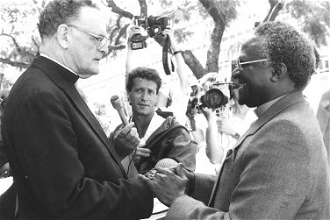Tribute to Walter Sisulu, an anti-apartheid hero
Former Catholic Institute for International Relations, director Ian Linden, reflects on the times he met African National Congress veteran Walter Sisulu, who died on 5 May 2003.
In a world in which political success often spells personal enrichment, it was heartening to visit Walter and Albertina Sisulu's little house in Soweto. There it was, the house of one of the great names of the anti-apartheid struggle, unassuming and unprotected, with a battered fence, in a dusty road, no different from hundreds of others in the vast township.
The time that I remember best was not long after Walter's release from Robben Island prison. He had still not got used to having space and spent a lot of time in a small study at the back of the house from which he emerged for visitors. The white hair made him look venerable, and the gentleness, politeness and kindness seemed from another age.
How could a personality like this have grown out of the grim and lonely routines of the island? It came as no surprise to learn later that it was he who had drawn Nelson Mandela into the ANC.
The other time, it was quite a formal visit with Archbishop Denis Hurley. The way Sisulu greeted him, it seemed like it was the archbishop who had spent most of his life in prison to free his country: a great bear hug, and, a touch of the statesman, a fulsome speech about the gratitude of the people of South Africa for what the archbishop had done. And all this was delivered in the tiny front room.
There is only one word to use to speak of the quality that such men radiated: spirituality. Walter Sisulu had the spirituality that grew from political struggle. CIIR will be thinking of his distinguished widow and family at this time and, I know, will hope always to discover and celebrate that spirituality in its work. Sisulu was among the group of radicals who formed the African National Congress Youth League in 1943/44 and had been a central leader in the party since. He was 90 when he died.
















